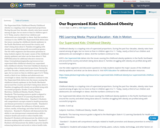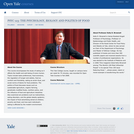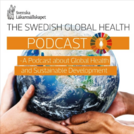Our Supersized Kids: Childhood Obesity
Childhood obesity is a crippling crisis of supersized proportions. During the past four decades, obesity rates have soared among all ages, but no more so than in children ages 6 to 11. Today, nearly a third of our children and adolescents are overweight or obese. And the numbers continue to rise.
KSPS's Our Supersized Kids delves into the issues causing the childhood obesity epidemic in the Pacific Northwest and around the country and what’s being done about it. Families struggling with obesity are profiled along with successful programs.
Use the video segments and discussion questions to help students explore the major causes of the childhood obesity epidemic and what can be done about it. Visit KSPS Education for additonal educator resources.
https://www.pbslearningmedia.org/resource/our-supersized-kids-childhood-obesity/our-supersized-kids-childhood-obesity/
Overview
Childhood obesity is a crippling crisis of supersized proportions. During the past four decades, obesity rates have soared among all ages, but no more so than in children ages 6 to 11. Today, nearly a third of our children and adolescents are overweight or obese. And the numbers continue to rise.
Our Supersized Kids delves into the issues causing the childhood obesity epidemic in the Pacific Northwest and around the country and what’s being done about it. Families struggling with obesity are profiled along with successful programs.
Grades: 3 and up
Subjects: Nutrition, Childhood Obesity, Health, Fitness
Standards: This learning resource guide is aligned to the Washington State K-12 Learning Standards for Health and Physical Education.
· Standard 1: Students will comprehend concepts related to health promotion and disease prevention to enhance health.
· Standard 2: Students will analyze the influence of family, peers, culture, media, technology, and other factors on health behaviors.
· Standard 4: Students will demonstrate the ability to use interpersonal communication skills to enhance health and avoid or reduce health risks.
· Standard 5: Students will demonstrate the ability to use decision-making skills to enhance health.
· Standard 7: Students will demonstrate the ability to practice health-enhancing behaviors and avoid or reduce health risks.





